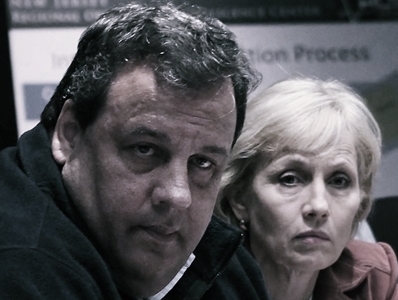Secrecy shrouds Christie, Guadagno and ‘Doublegate’ drama

By Mark Lagerkvist | New Jersey Watchdog
What happens when a criminal investigation is used to conceal evidence rather than uncover the truth?
RUNNING THE BLOCK: Gov. Chris Christie’s administration is fighting to keep secret all details of a pension probe implicating his second-in-command, Lt. Gov. Kim Guadagno.
That question is at the heart of a New Jersey political drama as Gov. Chris Christie‘s administration fights to keep secret all details of a pension probe implicating his second-in-command, Lt. Gov. Kim Guadagno.
As a county sheriff, Guadagno made false and conflicting statements that enabled a top aide to improperly collect an $85,000 pension on top of his $87,500 salary, as first revealed by a New Jersey Watchdog investigative report in 2010.
In the latest episode, Christie’s lawyers are stonewalling the state pension board that requested a probe by the attorney general’s Division of Criminal Justice in May 2011 — nearly three years ago.
Last week, Police and Firemen’s Retirement System trustees finally were allowed to see a letter from DCJ they were supposed to receive in June 2012. State officials were unable to explain why it took 20 months for the letter to reach the board.
The letter stated that the investigation was “closed,” but contained no information about the findings. Yet DCJ suggested the PFRS board take “whatever administrative action you deem appropriate.”
“It’s difficult to take appropriate action without the supporting material,” trustee Richard D. Loccke said. The board approved Loccke’s motion to request DCJ’s investigative files.
The Christie administration has argued repeatedly that all records are exempt from public disclosure because of the criminal investigation.
The Mercer County Superior Court, meanwhile, DCJ is trying to fend off a public records lawsuit by a New Jersey Watchdog reporter.
Over the state’s objections, Judge Mary C. Jacobson ordered DCJ to produce an index of its investigatory records. Lawyers for the state and reporter are arguing over which documents, if any, must be released.
When she served as Monmouth County sheriff, Guadagno hired Michael W. Donovan Jr., a retired investigator for the county prosecutor, as her “chief of law enforcement division.”
On still another front, Administrative Law Judge Linda Kassekert has instructed the state Treasury to release 25 records to the reporter. Those documents were gathered by the agency during an internal review of the Guadagno-Donovan matter.
The next question is whether the Government Records Council, comprised of Christie cabinet members and gubernatorial appointees – will be willing to enforce Kassekert’s order.
Want more controversy? Consider this conflict-of-interest: Guadagno once served as deputy director of DCJ, the arm of government that supposedly investigated her actions.
Christie has never publicly commented on whether he should have used his constitutional authority to appoint an independent prosecutor or investigator to handle the case.
Spokesmen for Christie, Guadagno and three attorneys general who held that post since 2011 have declined to speak about the probe.
The “Doublegate” pension scandal began in 2008, the year before Guadagno was elected lieutenant governor.
Guadagno announced Donovan’s appointment in a memo to her staff. The sheriff’s official website subsequently identified Donovan as “sheriff’s officer chief,” supervising 115 subordinate officers and 30 civilian employees.
But Donovan faced a legal problem. As a sheriff’s officer chief , a position covered by the pension system, Donovan should have been required to stop receiving retirement checks and resume his contributions to the Police and Firemen’s Retirement System.
To enable her chief officer to double-dip, Guadagno made false and conflicting statements about Donovan’s job title.
In county payroll records, the oath of office and a news release, Donovan was listed as the sheriff’s “chief warrant officer” — a similar sounding, but low-ranking position that’s exempt from the pension system. A chief warrant officer is responsible for serving warrants and other legal documents.
On Guadagno’s organizational chart, Donovan was listed as chief of law enforcement. The position of chief warrant officer cannot be found on the chart.
While sheriff’s chief, Donovan pocketed $227,000 in checks from PFRS. Since he did not re-enroll in PFRS, he avoided $18,000 in contributions. If the state had decided Donovan violated pension law, he could have been forced to repay $245,000.
The stakes are also high for Guadagno. Under state statute, “Any person who shall knowingly make any false statement or shall falsify or permit to be falsified any record or records of this retirement system … shall be guilty of a misdemeanor.”
# # #
DISCLOSURE: Investigative reporter Mark Lagerkvist is the plaintiff in the public records cases against Division of Criminal Justice (Mercer County Superior Court, MER-L-464-13) and Treasury (OAL GRC 6985-13 & GRC 2011-110).
The post Secrecy shrouds Christie, Guadagno and ‘Doublegate’ drama appeared first on Watchdog.org.







